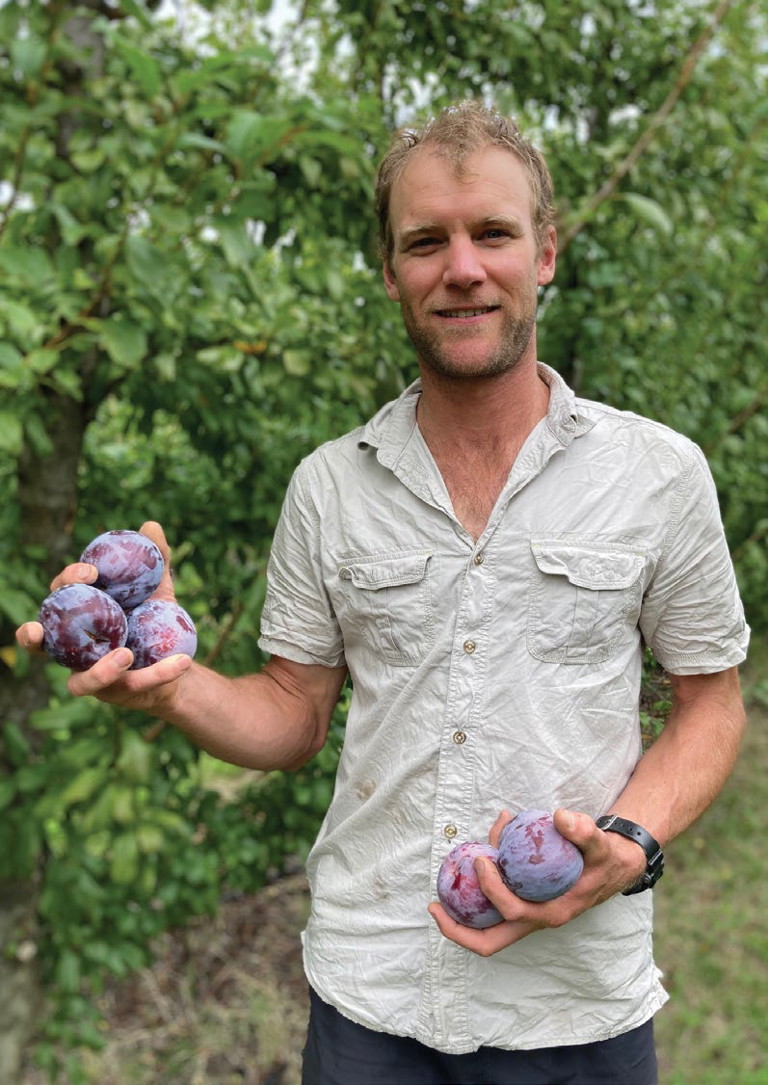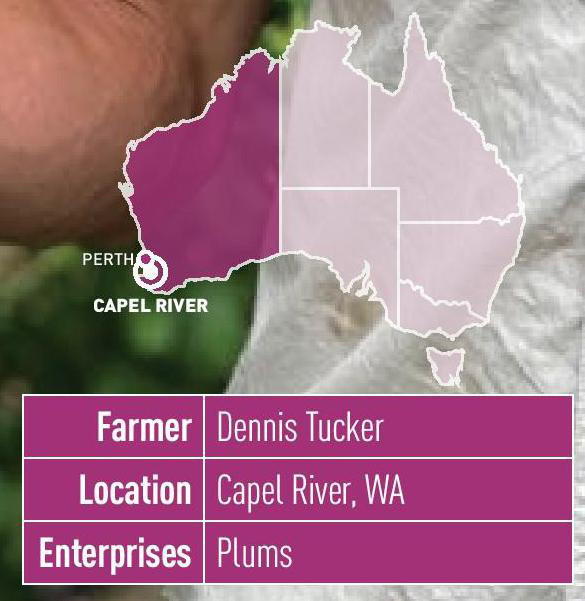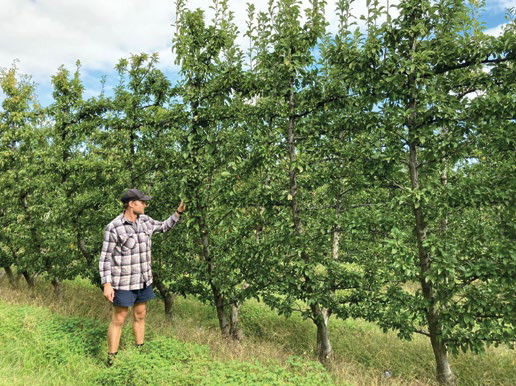Grower profile Dennis Tucker
BY SCARLET ROXBY MERCHANDISER, STONEFRUIT WA


DENNIS with a handful of Flavour Fall Pluots, fresh from the tree.
There are over 170 stonefruit growers in Western Australia and they all have a story to tell. I recently got to chat with Dennis Tucker about his Capel River Orchard.


Where is your farm, how long have you been orcharding there and what do you grow?
My farm, technically my father’s farm, is at Capel River, located between Capel and Donnybrook. My great, great grandfather farmed down the Stirling near the mouth of the Capel River and moved 15km upstream to our current location here at Capel River in 1923.
Various horticultural pursuits, as well as beef cattle and dairy, have been undertaken here in the past 98 years. In the mid-1990s, Dad began increasing the scale of our stonefruit operation. He started planting blocks of high-density (1,800–2,500 trees/hectare) plums to supply the export market.
I moved here and began working full-time in 2013, and plums are now the primary focus of our operation. Some of my father's original high-density plum blocks are still in full production, however, our markets have shifted. About 80 per cent of our fruit is sold in Western Australia (WA), 10 per cent sent over east and 10 per cent exported. The bulk of our production is late season, February to April, as we believe our climate is most suited to growing varieties targeting this marketing window.
Have you changed the way you grow stonefruit in recent years or implemented new technology/ practices?
A high-density production system revolves around maximising yield per hectare whilst minimising labour cost per unit of grade one fruit produced. This thematic and basic orchard structure hasn't changed over the last 25 years. However, tinkering is ongoing. Newer plantings have a maximum height of 3m, allowing 70 per cent of the work to be done from the ground. It is easier to manage labour on the ground, more efficient and safer.
Under the guidance of our advisor, Geoff Godley, and my father's encouragement, I have embraced the orchard systems advocated by Bas van den Ende, a research scientist from the Victorian Ag Dept. Over the past eight years, our management has changed to reflect this. The result is a laborious summer pruning regime with the aim being to improve light penetration into the tree, especially the lower half of the canopy. More light improves fruit colour and sugars. The pruning also extends the commercial fruiting life of the permanent branches.
The trellis system used on the farm maximises yield, while minimising labour costs.
I have also reduced our nitrogen inputs down to around 100kg N/Ha. I believe this helps reduce vegetative growth and leads to an improvement in fruit firmness. Combined with the summer pruning, it substantially reduces the winter pruning load.
What issues and challenges (especially regarding COVID) have you managed with this season?
This season, along with most other growers, thought was put into being proactive at the beginning of the season to reduce labour requirements and plan ahead for labour requirements to liaise with potential workers and other growers about labour ‘sharing’. Whilst there were certainly fewer backpackers around Donnybrook, we managed okay, but I'm expecting it to be more difficult next season.
The plum market had its challenges, but that's nothing unusual. It seemed that the export market was subdued, which probably added to the annual February plum glut in our domestic market. Hopefully, as borders reopen, the exports can pick up.
What would be your key message for consumers about WA Stonefruit?
I distinctly remember a friend visiting and asking how we clear more forest to plant orchard to replace existing plantings that have degraded the land. I pointed out some oranges that my great grandfather had planted — they are still in production today. The ground doesn't get run down; it is built up, I explained. He is a mechanical engineer from Perth — it shows some preconceptions that exist about our farming systems.
Like most modern growers, we monitor soil moisture to conserve water and ensure nutrients aren't leached through the soil, maintain ground cover to stop erosion and use integrated pest management to limit our chemical usage. Caring for the land and farming sustainably is massively important. It is hard to quantify many metrics around these themes, but it is good for the public to know as it enhances our social licence to operate.
When choosing a piece of fruit, I would say that bigger is better as they are generally sweeter. Finally, store stone fruit in the fridge, not the banana bowl — it will keep so much better!
Do you have a favourite stonefruit recipe?
I'm not much of a cook, but I do like a few stewed plums to give me my plum hit in the winter and spring offseason.
MORE INFORMATION
For more information contact Shay via email shay.crouch@perthnrm.com or phone (08) 9374 3306.
FOLLOW WA STONEFRUIT

@wastonefruit

@WeLoveWAStonefruit